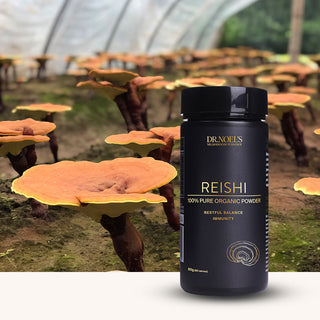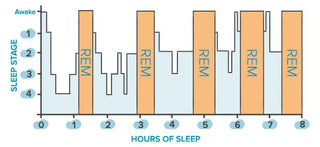Lion’s mane mushrooms are being studied for its effects on sleep. Herciucum Erinaceus are a type of medicinal mushroom that has been used in traditional Chinese medicine for centuries. Recent studies have shown that lion’s mane mushrooms can help improve sleep quality. In this article, we’ll take a look at the science behind how lion’s mane mushrooms can help you sleep better.

What Are The Most Common Sleep Disorders?
People attempting to use Lion’s Mane mushroom may suffer from a variety of sleep disorders that can affect people of all ages. The most common sleep disorders include:
- Insomnia: This is the inability to fall asleep or stay asleep. People with insomnia may wake up frequently during the night or early in the morning and have difficulty getting back to sleep.
- Sleep apnea: This is a condition in which a person stops breathing for short periods of time during sleep. It can cause loud snoring and daytime fatigue.
- Restless legs syndrome: This is a condition in which a person has an irresistible urge to move their legs, often accompanied by an unpleasant sensation in the legs. It can make it difficult to fall asleep and stay asleep.
- Narcolepsy: This is a condition characterized by sudden and uncontrollable episodes of sleep during the day. It can cause severe daytime fatigue and interfere with daily activities.
According to the study findings published in the Journal of Clinical Sleep Medicine, the occurrence of sleep disorders (especially obstructive sleep apnea and narcolepsy) has increased appreciably from 2013 to 2016.
The prevalence of narcolepsy increased from 14% to 44.3% whereas, obstructive sleep apnea increased by 41% over the three years.
What Are The Negative Effects Of A Lack Of Sleep?
Sleep deprivation or a lack of sleep can have a number of negative effects on your health, including:
- Daytime fatigue or sleepiness
- Difficulty concentrating or paying attention
- Memory problems
- Irritability or moodiness
- weakened immune system
- Increased risk of accidents
- Higher stress levels
- Increased risk of heart disease, diabetes, neuropathy, and obesity.
How Are Sleep Disorders Traditionally Treated In Western Society?
Prior to consuming Lion’s Mane to treat sleep disorders, it is important to understand the common Western treatments for sleep disorders depends on the type of disorder. Common treatments include:
- Cognitive behavioral therapy: This is a type of therapy that can help people with insomnia change their thoughts and behaviors around sleep.
- Sleep medications: There are a variety of medications that can be used to treat sleep disorders. These include hypnotics, sedatives, and antidepressants.
- Natural supplements: Many people are now turning to natural plant based supplements to improve their sleep. Medicinal mushrooms are being explored and studied for their efficacy on sleep
Lion’s Mane And REM Sleep

There are ongoing studies around Lion’s mane and how it can help improve the quality of REM sleep. REM sleep is the stage of sleep when we dream and our brains are active. Lion’s mane may help improve REM sleep by reducing the time it takes to fall asleep and increasing the length of time spent in REM sleep. If you are looking to improve your sleep quality, you may want to try consuming lion’s mane in the evening before bed.
Lion’s mane mushroom is an adaptogenic fungus. These natural bioregulators work with the body to adapt to stress and anxiety which can affect REM sleep. In this 2016 study, the intake of water extract of Hericium erinaceus advanced the sleep-wake cycle which may serve as a functional food in the prevention and treatment of delayed sleep phase syndrome.
A 2019 study evaluated whether Hericium erinaceus treatment improved sleep after 8 weeks of supplementation in overweight or obese participants. Researchers also assessed the levels of biomarkers like brain-derived neurotrophic factor (BDNF) and its precursor pro-BDNF before and after H. erinaceus supplementation.
The result of the study, conducted on 77 people, showed that oral H. erinaceus supplementation decreased sleep disorders.
Can Lion’s Mane Improve sleep?

Lion’s Mane mushrooms may be able to improve the quality of sleep. A pilot study evaluated the effects of a 4-week administration of Lion’s mane mushroom extract called Amyloban 3399. The research was carried out on female undergraduate students who are more prone to sleep problems. The study aimed to assess sleep quality and well-being.
Each participant was asked to collect saliva samples immediately upon waking to evaluate the levels of a particular chemical which is generally regarded as an accurate index of chronic stress. The chemical also reflects sympathetic nervous system activity which influences sleep.
Results showed that after the completion of the study, there was a decline in anxiety and insomnia. These findings suggest that taking Lion’s mane mushroom could improve negative mood and sleep disorder symptoms.
In an in vivo study from 2021, the effects of the mycelium of Hericium erinaceus on anxiety induced by continuous sleep disturbances were explored. This rodent-based study administered Lion’s mane mushrooms at two doses: 75 and 150 mg/kg. Sleep recordings were taken. Results showed that administration with Hericium erinaceus mycelium (at a dose of 150 mg/kg) improved anxiety and reversed NREM sleep disturbances.
Researchers concluded that the hericenones and erinacines in the mushroom which synthesize the nerve growth factor and brain-derived neurotrophic factor (BDNF) can modulate several pathways in the body to induce an antidepressant-like effect. This may be a dual-function supplement for sleep disruption improvement while ameliorating anxiety.
Does Lion’s Mane make you sleepy?
Lion’s mane does not make you sleepy. However, it may improve the quality of your sleep as mentioned above. Lion’s mane is a type of mushroom that is known for its cognitive-enhancing properties. Some people believe that lion’s mane can help with sleep because it can improve cognitive function throughout the day and reduce stress levels in the evening. Lion’s mane mushrooms are safe to consume and are generally well-tolerated by most people.
When is the accurate time of the day to take Lion’s Mane?
There is no definitive answer to this question. Most people prefer to take Lion’s mane mushroom supplements in the morning, while the brain is waking up and ready for executing functions. Taking Lion’s Mane mushroom products earlier in the day helps stimulate the Nerve Growth Factor, which is a type of protein that promotes the healthy and proper functioning of the human nervous system. Morning dosages allow enough time for the active compounds of the mushroom to react with the NGF in the body.
Others find that it is more effective when taken in the early afternoon. When the cognitive effects diminish into the evening, it may improve sleep.
Cortisol, the sleep cycle and Lion’s Mane
Cortisol is a hormone that helps to regulate the sleep/wake cycle. It is highest in the morning and gradually decreases throughout the day. When cortisol levels are too high, it can interfere with sleep. Too much cortisol can also lead to anxiety and stress, which can further disrupt sleep. Reishi mushroom is commonly used to reduce stress levels, making it a popular tea to consume before bed. Combining Reishi with Lion’s Mane powder in a tea may improve the sleep cycle and reduce cortisol over time.
Conclusion
Lion’s Mane mushrooms may be able to improve the quality of sleep, and we look forward to more research to support this. Please consult with your doctor before aiming to treat any serious illness with medicinal mushrooms. Medicinal mushrooms to improve sleep should be considered with a holistic health program of nutrition, exercise and lifestyle, and should not be a substitute for any medication you are taking.





